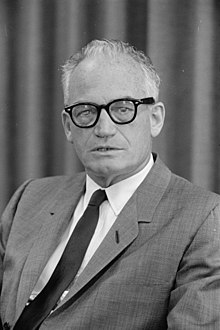Goldwater Republican
| Barry Goldwater | |
|---|---|
 |
|
| Chairman of the Senate Armed Services Committee | |
|
In office January 3, 1985 – January 3, 1987 |
|
| Preceded by | John Tower |
| Succeeded by | Sam Nunn |
| Chairperson of the Senate Intelligence Committee | |
|
In office January 3, 1981 – January 3, 1985 |
|
| Preceded by | Birch Bayh |
| Succeeded by | David Durenberger |
|
United States Senator from Arizona |
|
|
In office January 3, 1969 – January 3, 1987 |
|
| Preceded by | Carl Hayden |
| Succeeded by | John McCain |
|
In office January 3, 1953 – January 3, 1965 |
|
| Preceded by | Ernest McFarland |
| Succeeded by | Paul Fannin |
| Personal details | |
| Born |
Barry Morris Goldwater January 2, 1909 Phoenix, Arizona Territory, U.S. |
| Died | May 29, 1998 (aged 89) Paradise Valley, Arizona, U.S. |
| Political party | Republican |
| Spouse(s) | Margaret Johnson (1934–1985) Susan Shaffer Wechsler (1992–1998) |
| Children | 4 |
| Alma mater | University of Arizona |
| Signature |  |
| Military service | |
| Allegiance |
|
| Service/branch |
|
| Years of service | 1941–1945 (USAAF) 1945–1952 (ANG) 1952–1967 (USAFR) |
| Rank |
|
| Unit | |
| Battles/wars |
World War II Korean War |
Barry Morris Goldwater (January 2, 1909 – May 29, 1998) was an American politician, businessman, and author who was a five-term United States Senator from Arizona (1953–65, 1969–87) and the Republican Party's nominee for President of the United States in the 1964 election. Despite losing the election by a landslide, Goldwater is the politician most often credited for sparking the resurgence of the American conservative political movement in the 1960s. He was a vocal opponent to desegregation and the Civil Rights Act of 1964, believing it was an overreach of federal government. He also had a substantial impact on the libertarian movement.
Goldwater rejected the legacy of the New Deal and fought through the conservative coalition against the New Deal coalition. He mobilized a large conservative constituency to win the hard-fought Republican primaries. Though raised an Episcopalian, he was the first candidate with ethnically Jewish heritage to be nominated for President by a major American party (his father was Jewish). Goldwater's conservative campaign platform ultimately failed to gain the support of the electorate and he lost the 1964 presidential election to incumbent Democrat Lyndon B. Johnson, bringing down many conservative Republican office-holders as well. Jeff Fishel says, "The conservative faction of the party was on the defensive as a result of the magnitude of the election losses."
...
Wikipedia
